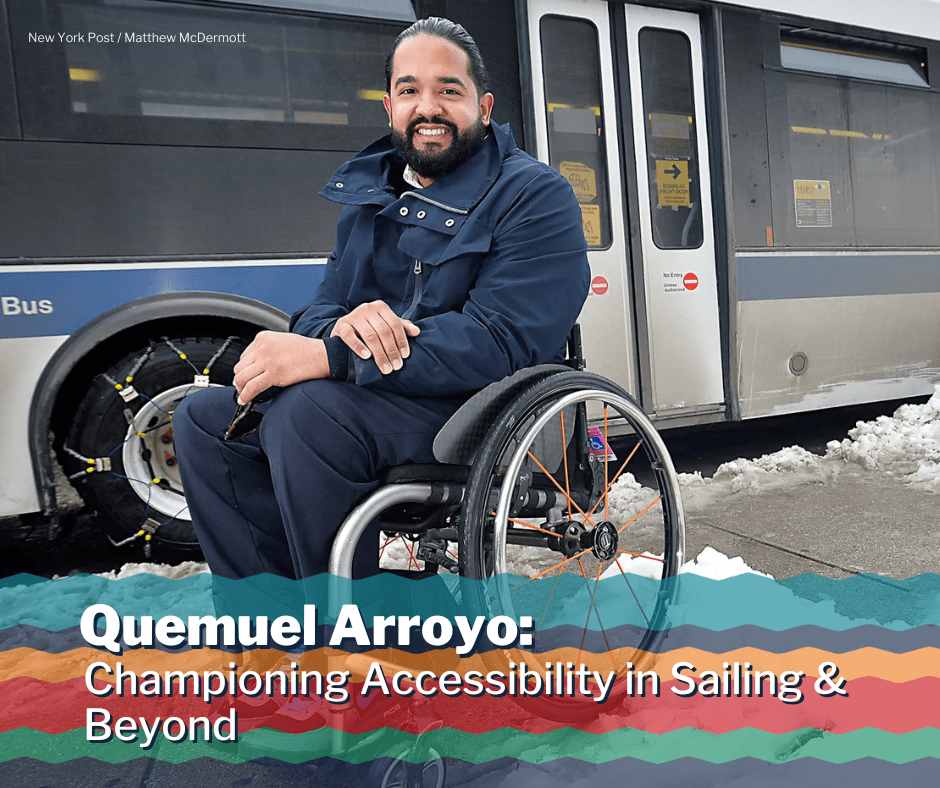
As we celebrate Hispanic Heritage Month at US Sailing this September and October, we were fortunate to sit down with Quemuel Arroyo, Chief Accessibility Officer for the Metropolitan Transportation Authority (MTA), to discuss his Hispanic heritage and his experiences as a disabled sailor.
Spending summers in the Dominican Republic, Arroyo grew up in the water. He was also a bit of an adrenaline junkie, seeking out new experiences.
“I very much identify with the water as a core pillar of my identity,” he said. “Being able get into the water was so important to me.”
Arroyo began sailing in New York City as a high school freshman at the Outward Bound School, where he was able to participate in a three day sailing expedition around Long Island Sound. He and a group of about six other students and staff were able to explore the city from the water – his first exposure to the world of sailing.
After Arroyo suffered a spinal cord injury at 18 while downhill mountain biking, his life drifted away from sailing and in other directions. He completed his undergraduate and masters at New York University, concentrating on urban design and public administration. From there, he went on to work for the New York City Department of Transportation; Charge, an electric scooter company; and most recently the Metropolitan Transportation Authority, where he is the first-ever Chief Accessibility Officer.
In his job with the MTA, Arroyo sees accessibility as a broader issue than simply addressing disabilities.
“Accessibility is about providing access to those who might have a different type of mobility or means to get around,” he said. Providing access in the sailing community involves breaking down these barriers as well. “It’s not enough to invite me to the party if I can’t access the dance floor. If I’m inviting someone who hasn’t been part of the space, I’m inviting them fully.”
Arroyo was able to get back on the water through Hudson River Community Sailing (HRCS), whose mission is to develop leadership and academic success among underserved New York City youth through sailing and maritime education programs. According to Arroyo, longtime friend Robert Burke, Executive Director of HRCS, convinced him to come back to sailing.
“It was a great opportunity for me to get back in a boat to sail with him – it really tethered me back,” said Arroyo. “The hook for me was this idea that HRCS can break down the social barrier or the financial barrier to the world of sailing for inner city youth.” Now, Arroyo serves on the HRSC board of directors where he played a pivotal role in providing adaptive sailing programs for the organization.
“I just love the idea of changing the fabric of what a sailor looks like in New York City and providing access not only to the waterfront and sailing, but also to teaching,” he said. “It has really opened up a whole new frontier for students.”
Arroyo’s passion for promoting diversity in the sport of sailing and in life extends to his membership on the US Sailing DEI subcommittee, where he is working on a strategy to diversify the identity of US Sailing.
“We are first and foremost lovers of sailing, but we are also a group of very diverse people who have come together for this common interest,” he said. “I really try to portray a change in this culture, in this space, that wants to be more welcoming, more inviting for people who may not normally fit the mold of what sailing used to look like.”
In speaking about some of the barriers that underrepresented groups face, Arroyo believes in having tough conversations – no matter how awkward or uncomfortable they may feel. “We’re so scared of awkward dialog – I say lean in and let’s get awkward,” he said. “Let’s talk about why you’re not here. Is it because you didn’t see the flyers, or did you have a preconceived notion of who was going to be there?”
He also noted challenges with engaging the sailing community at HBCUs (Historically black college and universities). “We’re struggling to diversify the students that we serve. We have to go out of our way to provide more scholarship opportunities and memberships to people who are struggling financially.”
In addition to his roles at the MTA and HRCS, Quemuel serves on the boards of the Outward Bound Schools and the Heidi Latsky Dance Company. He previously served as Interim President and Global Head of Community for GetCharged, Inc., and as Chief Accessibility Specialist for the New York City Department of Transportation.
